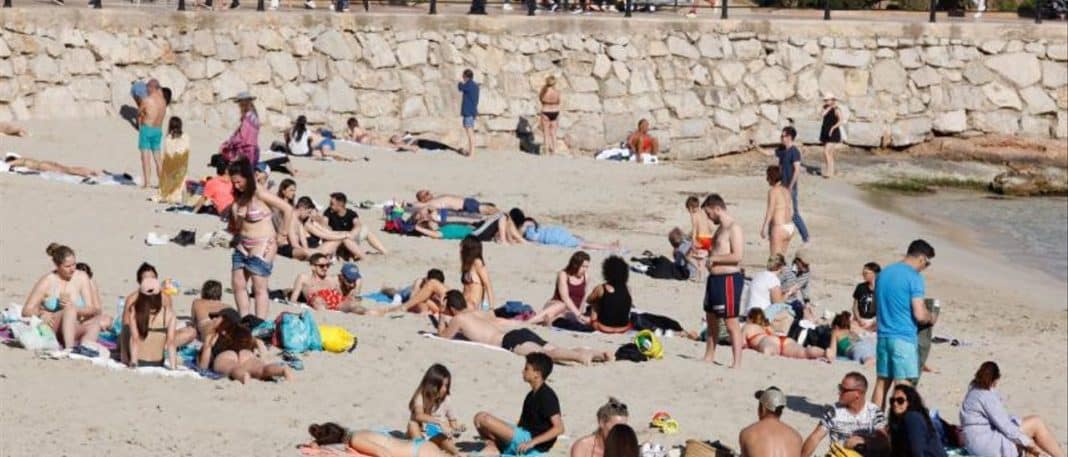After a blank year (2020) followed by a lack-lustre 2021, there is hope that things will get back on track this summer season. All sectors are confident that this will be the year of recovery, but everyone is also aware that the economic, social and international outlook is full of dark clouds, in addition to age-old problems that are unsolvable or worsening year after year.
The war in Ukraine, the price of fuel and airline tickets are problems that are this year added to others to which, unfortunately, we have become accustomed, such as illegal parties, traffic jams, the stench of sewage treatment plants….
Will the British come back this summer?
If there is one thing we miss from the pre-covid period, it is the British tourists. They were the majority (900,000 visited us) and those who spent the most during their summer vacations. José Antonio Roselló, vice-president of the Confederation of Business Associations of the Balearic Islands (CAEB), is optimistic and is confident that they will return: “You only have to remember what happened a year ago, when Portugal closed and, suddenly, Ibizan hotels that normally host families began to fill up”. He believes that the United Kingdom “will be reactivated and this summer will probably be the same as before the pandemic in terms of the number of tourists from that country”. He points out that this country “tried to restrain, to anchor its citizens during the health crisis, but it can no longer do so. Things are looking good this summer”. The same opinion is shared by Juan Miguel Costa, island director of Ibiza Tourism: “They will recover this year, unless something unforeseen occurs externally. But in normal conditions, yes, a good part of those 900,000 British people who vacationed here before the health crisis will return”.
Should we be worried about Turkey, Greece or Croatia?
Roselló’s answer is no: “Turkey could be affected, due to its proximity, by the war. The rest of the countries, such as Croatia, Tunisia or Greece, will not have problems, but I don’t think they can hurt us. We have a good name, I don’t think there is anything to worry about, although that wouldn’t be bad either because competition during summer is healthy”.
And will the conflict between Russia and Ukraine affect us?
“It is already affecting us. The war will also be long and will have a macroeconomic effect in the medium term. It remains to be seen whether it will affect tourism, everything will depend on whether the crisis worsens and is widespread,” says the CAEB vice-president. “We also depend on what happens with Germany and its purchases of Russian gas. In any case, the problems could become more evident in 2023,” he warns. However, he points out that “consumers make a piggy bank for their vacations, even if there is a crisis. And we have to bear in mind that this pandemic has generated two types of consumers: those who have pocketed income and want to spend it, and those who have had a hard time. The latter, in spite of everything, are also finding money for their vacations. Even so, he qualifies that in this war “we are permanently walking on the razor’s edge”. He fears that there could be “an escalation of tension”, from which then “we would come out badly if a mistake is made”.
Will air fares skyrocket?
Tourism depends, in large part, on the price of airline tickets, and these, in turn, on the cost of fuel, which is skyrocketing: “Currently it is more of a threat than a reality. It will depend on the price of oil. A drastic rise in the price of a barrel would become a threat. There is already an increase in ticket prices, although there are companies that are trying to avoid it because it affects demand,” says Roselló. For his part, the insular director of Tourism considers that some exorbitant prices that have already been seen on the booking websites are cases “that occur when there are exaggerated demands for various scheduled events on the island”. “I would like to think,” he continues, “that it will normalize later”. Ana Gordillo, president of the Pitiusas Hotel Business Federation, also suggests that these expensive tickets “are noticed on specific days. On weekends, the highest prices. On weekdays, the most affordable”. “We hope -she adds- that the increase in fuels does not affect the cost of flights. It could be a problem if traveling from Madrid costs the same as going to the Caribbean. That would have an impact, above all, on the middle classes”.
For the full article, please visit Diario de Ibiza website here.

